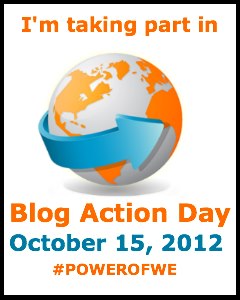Today is Blog Action Day! In 2010 I blogged about water. In 2011 I blogged about food. This year I am going to blog about the Power of We.
So what is Blog Action Day? For a quick recap, here is an extract of my article from last year:
Every year (for the past four years) on the 15th of October, there is a global Blog Action Day, where bloggers around the world write about one common problem in the world today, in order to try to raise awareness of a pressing issue.
Today is the 6th Blog Action Day in internet history, and tens of thousands of bloggers around the world will today be blogging about the Power of We.
The Power of We came about as a topic after bloggers were asked to vote on what topic they thought Blog Action Day 2012 should cover. Topics such as community, equality, anti-corruption and freedom (as suggested by yours truly) were all very popular, so the Blog Action Day team decided to make the theme the Power of We, a topic that encompassed community, equality, anti-corruption and freedom.
What To Blog About
 This year I am really at a loss as to what to blog about. Not because I have no ideas, but because the topic is so broad that I could write 10 posts on all different areas encompassed by the Power of We.
This year I am really at a loss as to what to blog about. Not because I have no ideas, but because the topic is so broad that I could write 10 posts on all different areas encompassed by the Power of We.
Here are just some of the ideas I had
- Focusing more on the freedom side of things, I could have discussed the power of people when we all act together and the influence we can have. The Arab Spring is a fantastic example of this, when people act together they can crush oppression. Libya is probably the best example of how this happened, people worked together and eventually managed to bring down the Gaddafi dictatorship. Yes lives were lost and change was not without suffering, and that is wrong, however now Libyan people are in the process of forming a democratic state. The country now has an elected General National Congress, and is moving forward.
- If I had gone down the equality route I could have talked about how equal rights are becoming recognised as important across the globe. A great example I could have talked about would be the Olympic and Paralympic Games. The London 2012 Games were the first ever to see every competing nation have both men and women competing, a massive step forwards in terms of gender equality. Also the global recognition the Paralympic Games received was a fantastic achievement. For the first time, the Paralympic Games had big sponsorship, like the Olympic Games has, suggesting that discrimination against disabled people has decreased, and people are now more open an accepting. Someone is no less a person just because they have a disability, and it would appear that more people are starting to understand this.
- I could have discussed how every single person on this planet has the ability to make a difference to the world we live in. Maybe not everyone is capable of revolutionising the world, however we all have the ability to influence and affect others, and it is what we choose to do with that influence and how we decide to interact with other people that makes us who we are. Everyone has the chance to be kind to someone else at some point, some people more than others. If we were all to seize every opportunity imagine what a better place the world would be.
There are so many different ideas and topics that I considered writing about, however in the end I decided to focus on an area much close to my heart.
The Power of We means community, what we can achieve if we work together. Co-operation for the greater good.
The Power of We is everything Blog Action Day stands for, relatively small and powerless bloggers from across the globe, uniting on one day, all posting about the same topic, to try and change something by raising awareness. In the past the day has been used to raise awareness about the environment, hunger, poverty and other critical issues. Blog Action Day has led people to donate to charity and has created a better understanding among many of pressing global issues.
I have no doubt that Blog Action Day has improved the lives of people around the world. The project has managed to get some fantastic associates such as Oxfam and ActionAid, because of the great work it does.
I am going to talk about the community we have here, the one you are a part of. The Technology Bloggers community. Okay we aren’t changing the world on a global scale, however we play our part.
The key word is community. We are all here working together in order to build a better blog, from which we can all prosper. Fantastic writers from all across the world contribute to our blog, giving readers a diverse range of material to read.
Why do we read? To enrich our lives, to learn new things and become knowledgeable on a topic. Reading makes us smarter, it opens up our mind to new ideas and concepts.
In return for their work, our writers get exposure to our hundreds of loyal subscribers and our thousands of monthly of readers.
Ultimately there only needs to be two people for the system to work. The writer writes the content, the reader reads and comments. The reader learns something and/or is able to take a new perspective on something, whilst the writer receives valuable feedback on their work. Just two people, and yet so powerful when working together.
Man kind wouldn’t be where we are today without co-operative work. When we work together as a team we can achieve more. It says it in the name: Together Everyone Achieves More.
Co-operation has built society as we know it. Every day, billions of people across the world go to work and co-operate with each other, to enhance and improve our world.
Ultimately I think this year I may have gone a little too broad in my choice of topic. I had so many ideas, and wanted to write about everything, and I think I have sort of tried to. I am not sure how well it has worked, this certainly isn’t your conventional post.
What are your thoughts, and will you be blogging about the Power of We?


